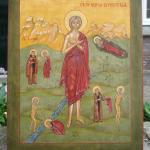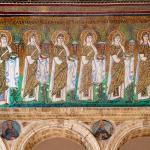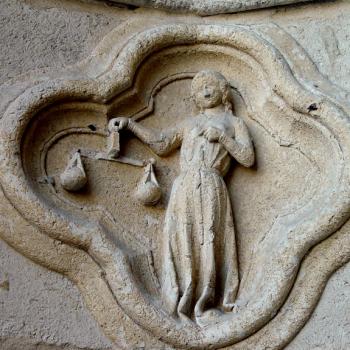
Neither does God accept doctrines apart from good works, nor are works, when divorced from godly doctrine, accepted by God. What does it profit a man to be an expert theologian, if he is a shameless fornicator; or to be nobly temperate, but an impious blasphemer? The knowledge of doctrines is a precious possession; there is need of a vigilant soul, since many there are who would deceive you by philosophy and vain deceit.[1]
It is far more important to be kind and considerate, to help those in need, than it is to accumulate for ourselves a rich storehouse of knowledge and use it to impress others. Theological doctrines can be invaluable, and knowing how and why we have the doctrines we do, can help people who are confused and trying to understand the faith. But we must not neglect the point of it all. Christ not only came to show us God’s love for creation, revealing, in the process, the truth of the Triune nature of God, but to show us that God has made room for us to join in and with that love, to bond with God in love and then through that bond, to love all that God loves. We are to look to the whole of creation and see it in and through the way God loves it, treating everyone in it the way we would treat anyone we love. If our beloved is in pain, we would do what we can to relieve them of that pain. If they are impoverished and hungry, we would share with them what we have. The more we do this, the more we show kindness to those in need, the more we embrace love, and the more we will find ourselves connected with and join with God and God’s eternal act of love. On the other hand, those who neglect love, those who turn away from it, especially when it is done in full knowledge of what they are doing, will find they cut themselves off from God’s love. They will experience life without the blessings of that love, not because God does not want them to be blessed, but because they have denied the means by which such blessings flow, and so it can be said they will experience the consequences of their actions (cf. Prov. 19:17). Thus, we should heed what Cyril has said, recognize the wisdom of his words, so our life and our eschatological fate can be blessed. “Listen to advice and accept instruction, that you may gain wisdom for the future” (Prov. 19:20 RSV).
We should join ourselves with Christ; we do this by opening ourselves up to him and the love which he shares. We must embrace it, using it as the foundation for our actions. In this way, we will find ourselves participating in the divine life. We can and will be able to do so in a variety of ways, because, as St. Cyril explains, Christ can come to us in many forms, each providing another means by which we can engage him and his love:
The Savior comes in various forms to each man for his profit. For to those who lack joy, He becomes a Vine; to those who wish to enter in, He is a Door; for those who must offer prayers, He is a mediating High-Priest. Again, to those in sin He becomes a Sheep, to be sacrificed on their behalf. He becomes “all things to all men” remaining in His own nature what He is. For so remaining, and possessing the truly unchangeable dignity of the Sonship, as the best of physicians and a sympathetic teacher, He adapts Himself to our infirmities. He is Lord in truth, not having advanced to the Lordship, but possessing that dignity by nature. He is called Lord, not improperly as we are, but in the very truth He is Lord, since by the decree of the Father He has Lordship over His own works. [2]
Jesus shows us that love can be and will be adaptive to the needs of the beloved by adapting himself to us and our needs. We should do likewise. We must engage others where they are at, to adapt ourselves and our actions to help them deal with the trials and tribulations of their lives. If they need food, we give them food. If they need a shoulder to cry on, we give them that. If they need words of comfort, we say them. If they need answers to questions, we give what we can, recognizing, of course, in all situations, we are limited in what we can do. We should not let such limits prevent us from doing what we can, because, the more we do, the more we engage others in the spirit of love, the more such love will serve as a leaven making all our actions more effective. What is important is we act in and engage others with love, recognizing it is how God works in and engages us.
“Many are the plans in the mind of a man, but it is the purpose of the LORD that will be established” (Prov. 19:21 RSV). We might have all kinds of plans which we want to accomplish in our lives, but we must always let them go if and when they get in the way of the plan of the Lord, the plan of love. For God has revealed to us what love can and will do for creation, what love, indeed, will establish. God is love, and as God will be all in all, so love will be all in all. We must focus on that love and act on it. Everything else, including our theological explorations, must be built upon it, helping to serve that love instead of getting in its way.
[1] St. Cyril of Jerusalem, Procatechesis and Catechesis 1-12. Trans. Leo P. McCauley, SJ and Anthony A Stephenson (Washington, DC: CUA Press, 1969), 120 [Catechesis IV].
[2] St. Cyril of Jerusalem, Procatechesis and Catechesis, 198 [Catechesis x].
Stay in touch! Like A Little Bit of Nothing on Facebook.
If you liked what you read, please consider sharing it with your friends and family!
N.B.: While I read comments to moderate them, I rarely respond to them. If I don’t respond to your comment directly, don’t assume I am unthankful for it. I appreciate it. But I want readers to feel free to ask questions, and hopefully, dialogue with each other. I have shared what I wanted to say, though some responses will get a brief reply by me, or, if I find it interesting and something I can engage fully, as the foundation for another post. I have had many posts inspired or improved upon thanks to my readers.













